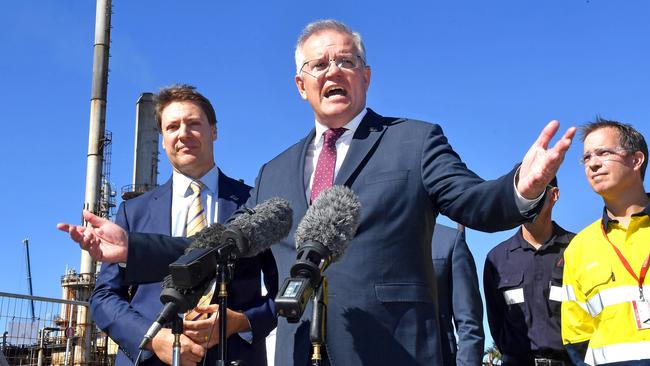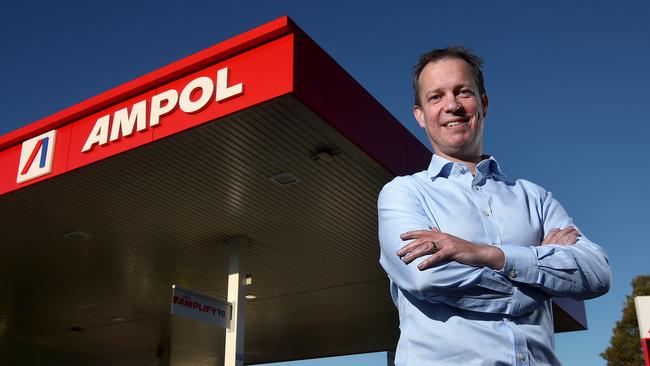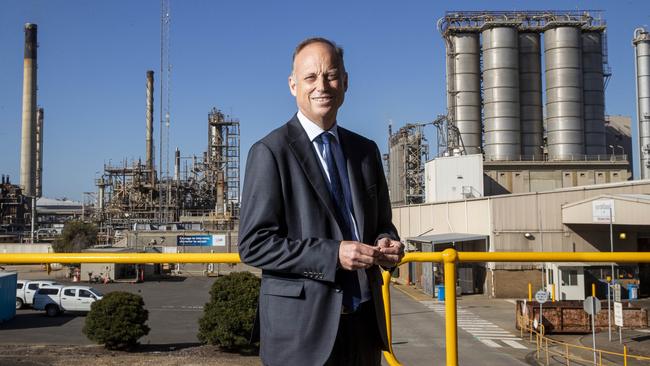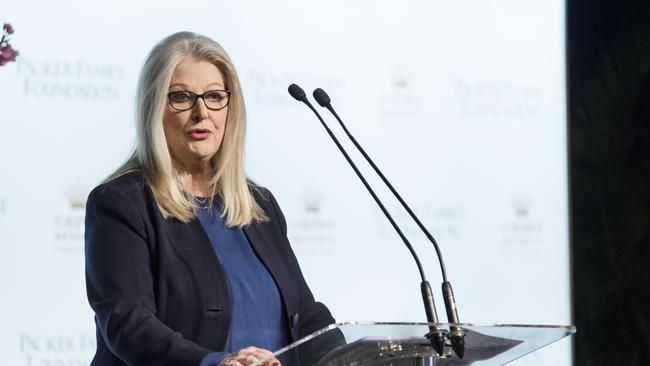
Jobs are clearly important, but there are better ways of boosting employment than handing $2bn in direct subsidies to Viva and Ampol shareholders.
Some could even argue there is something a little incongruous about shutting down aid to the car industry, but keeping it going for the refinery industry. Or spending big money on two oil refiners when the electric car industry badly needs more infrastructure spending.
When Ampol releases its new energy and decarbonisation policy on Thursday you can expect some government-friendly announcements — like a case study on a green hydrogen terminal and transport, along with alternatives such as batteries.
There will also be commitments to net zero emissions by 2040, which go a little further than Canberra.

Ampol chief executive Matt Halliday banged the energy transition drum enough to flag energy transition and he owes Canberra something after it agreed to eliminate his downside risk on oil imports and allowed him to hang on to the upside.
The stock prices of Viva and Ampol told the story on Monday — up 7 per cent and 6.1 per cent, respectively.
The downside is not so easy to measure because taxpayer funds are not listed on the bourse, but if they were they would be down a tonne.
To be fair, there is a more complex argument about fuel security and there are plenty of sectors in the economy that rely on, say, diesel support.
Ampol shareholders will collect up to $108m a year in support payments when the import parity price is below its cost of production.
There is also $125m to upgrade to low sulphur petrol, which should have happened already, and $40m in back payments.
The market widely expected Ampol to close its Lytto
n refinery, but the cash support from Canberra was such that Halliday had no option but to take the cash and keep the plant going for another six years.
Scott Wyatt, at Viva, was less sure, but both have made out like absolute bandits.
The refiners margin is effectively the import parity price, which is the price Wyatt would have to pay to import fuel.
His cash costs to keep his refinery going work out at $7 a barrel and another $2 covers capex, which puts the total cost at $9 for something he could import for $6.
Clearly the maths doesn’t work but don’t worry now if you are a Viva or Ampol shareholder because the Prime Minister has agreed to pick up the tab up to $10.20 a barrel.

In other words, the taxpayer will cover the losses for Viva and Ampol just to keep them operating their refineries for another six years. The question is why?
And the answer is jobs — as we have learned with the car industry, it doesn’t make a lot of sense to keep paying subsidies to subscale plants when they are going to close anyway. But that is precisely what Morrison is doing here, throwing $2bn at Ampol and Viva shareholders to keep subscale refineries operating.
A few years ago Australia had eight refineries, but now there are only two that cost the government $2bn to keep open.
The eight refineries in total were the same size as just one in Singapore or India, so locally they simply can’t compete.
The refining business is highly cyclical depending on demand and supply, but Morrison and Energy Minister August Taylor have now removed the downside for Viva and Ampol.
The rationale is fuel security, because keeping a refinery in Brisbane or Geelong is meant to ensure that Australia will always be able to get its hands on fuel even, in a pandemic. The trouble with this argument is that fuel security has never been threatened, so why are Morrison and Taylor so worried now?
Facts are not always on the front foot in politics, as evidenced by Taylor’s release on Monday claiming credit for lower electricity prices due to his big stick legislation. Not a mention of the flood of new supply on the market due to the mass increase in residential and industrial solar panel installations.
Morrison clearly loves spending our money and sometimes he does it well, but this time he has failed dismally and granted a complete gift to Ampol and Viva shareholders.
A listen to the shareholder calls shows just what a joke it is, because the questions were all about the next capital return and what was going to come next.
BAML’s David Errington couldn’t believe the shareholder largesse and asked both companies: “What is the catch?”
The catch is Morrison has drunk too much debt kool aid and politically clearly sees no downside in throwing away our money, with enough people inexplicably buying the fuel security line.
Crown plays hardball

Crown chair Helen Coonan didn’t exactly take the right message on Monday by responding to shareholder calls for some thought to the takeover bids for the company.
She showed Blackstone the door without a second thought and is offering a little more time to Star before no doubt doing likewise.
Coonan is trading ahead of an undisclosed Austrac investigation and two royal commissions, all of which have the potential to be negative.
A 10 per cent shareholder, Blackstone knows its $12.35-a-share bid will go nowhere in the present environment, but it isn’t going anywhere right now.
The Star bid has some issues, like also being too low and myriad potential ACCC concerns by combining the two Sydney operations, and no doubt Victorian government opposition on the grounds that a Star-controlled Crown would jeopardise its events roster.
The Sydney Crown operation has little in the way of function capacity compared to its Melbourne facilities or Star in Sydney.
Incitec battle for Johns
Incitec Pivot boss Jeanne Johns has a battle on her hands to recover past glory, with the company’s $110m first-half earnings disappointing more for the way the company handled operational issues.
At a time when fertiliser prices are strong, running 50 per cent ahead of year-ago prices, the company should be doing better, but manufacturing snafus have left shareholders hoping for a promised rebound in the second half above last year’s $215m level.
This will depend on better operational performance than Johns has delivered, because the external conditions could be better with strong farm demand and decade-high prices across her markets.
Johns’s halo has slipped somewhat and the pressure is on to show the naysayers wrong.
Incitec Pivot’s stock recovered from bigger losses to close down 1.7 per cent at $2.37 on Monday, down from March highs at $2.94.
The issue is whether the production problems at the Waggaman plant in the US and elsewhere are bad luck or bad risk control.




In business, the concept of a win-win deal is rare and as each analyst spoke out in wonder at Scott Morrison’s $2bn in handouts to the refinery sector, the obvious loser is the taxpayer.